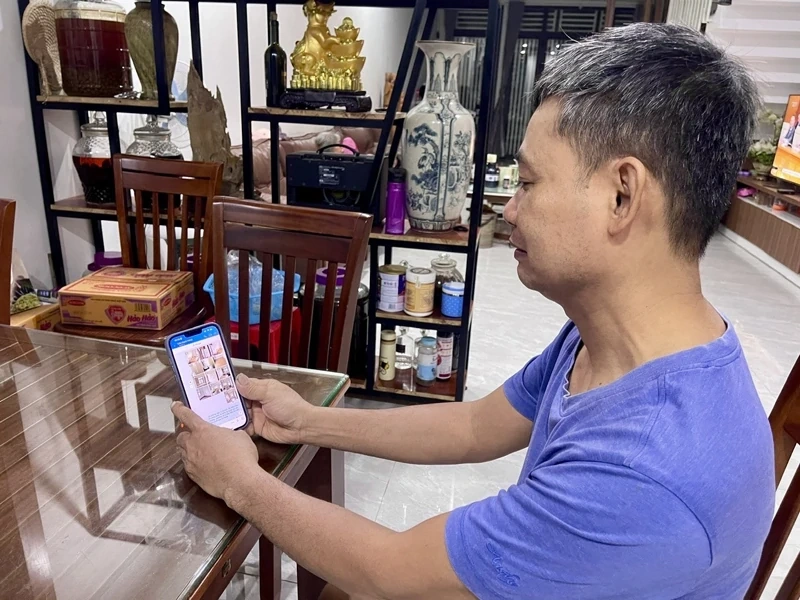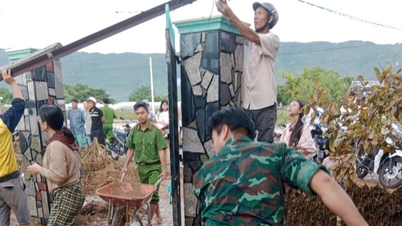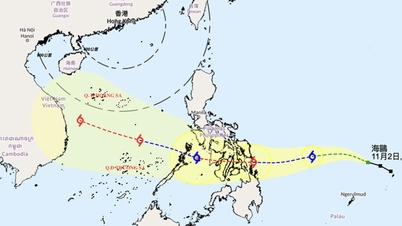
Be careful before making money transfers over the phone. (Illustration photo)
The “perfect scenarios”
The story began one evening when I had just posted an apartment for rent in Dong Quang ward. Less than 10 minutes later, my phone, zalo, and messenger continuously vibrated with dozens of messages asking to rent. Everyone spoke softly, politely, and used very familiar phrases: "I am the boss's assistant working in Japan. In about two weeks, the boss will return to the country to settle down. I need to rent an apartment with full amenities to live in immediately." At first, I was secretly happy to meet a "qualified" tenant who was also willing to rent long-term. The other person texted continuously, asking carefully about every small detail: "Does the house have a refrigerator, a water heater, can I move in right away?". When I answered "yes", they immediately said they would transfer the deposit immediately to hold the place for the boss. A few minutes later, I received a photo of the transfer transaction, with the code, time, and bank clearly displayed. But after waiting for a long time, the account was still empty. When I questioned, the other person immediately explained: "Because the international transaction needs to be verified, please transfer 5 million VND to me for confirmation, then I will return it immediately." With a firm voice and urgent attitude, if I was not alert, I probably would have transferred the money like many other victims.
My case is not an isolated one. On the groups “Houses for rent, boarding houses in Thanh Hoa ”, many people shared similar experiences, only with different names and roles. Someone said: “Just 5 minutes after posting the ad, someone texted the company boss, talked sweetly, sent a photo of the money transfer as if it were real, then said it was a bank error, asking me to temporarily transfer 500,000 VND for verification”. Another person received a message from an “assistant” saying that the boss was in Taiwan, was about to return home for a long-term business trip, and wanted to rent a house for his mother and daughter to live with. Everyone urged them to “close quickly, transfer the deposit urgently”, but no one actually showed up to see the house. The common point in all stories is that the subjects always create a sense of trust with a professional tone, polite way of addressing and sophisticatedly edited transaction photos. When the homeowner accidentally transferred the “verification” money back, they immediately disappeared, blocked contact, leaving behind a bitter lesson.
These scammers even create multiple fake accounts, constantly changing their names and profile pictures: today it’s “Ngoc Lan, assistant to the Japanese boss”, tomorrow it’s “Tran Hung, hiring for a company”, or “Minh Anh, an employee about to return home”. Even if the script changes roles, the plot remains the same: Lure the homeowner into believing that the money has been transferred, then cleverly force them to transfer it back themselves.
In reality, these tricks are not new, but they still easily trap many people. The root cause lies in the hasty, subjective mentality of many landlords - those who only want to rent quickly to earn more income, so they easily believe in the polite appearance and skillful speech of the "tenant". Scammers are very good at capturing that mentality: They create a professional impression, create fake evidence such as photos of successful transactions, and then cleverly urge the landlord to "confirm" by transferring money back. Only when the money is not in the account, and communication is blocked, do many people realize they have been scammed. Sadly, some people lose several million VND, some lose an amount of money equivalent to a month's effort, but the common point is that they all fall into a carefully staged trap based on trust and haste.
When trust becomes a trap
Ms. Le Lam Giang (Ham Rong ward), one of the first people to speak up to warn, shared: “They are very sophisticated, talking naturally, sending pictures of money transfers that look real. I almost got scammed if I didn’t check the statement again. After that, they blocked all communication. I posted a warning on Facebook and found out that many other people had the same experience.”
Ms. Hoang Quynh Chi, owner of a house in Quang Phu ward, also confirmed: “I posted the ad for less than 10 minutes and 3 people asked to rent it for the “boss”. They did not bargain, did not ask for the price, just wanted to close the deal right away. Looking back at the messages, I saw the same words, only the sender’s name was different. If I had not been suspicious, I would have lost money.”
Many people have been tricked in two ways: first is a fake money transfer image, then a “verify account” link that makes them lose access to online banking. A perfect scam, created by the haste of the victim himself.
According to cybersecurity experts, this is a form of online financial fraud that is showing signs of increasing, characterized by not directly appropriating money but luring victims to transfer money themselves. The group's tricks are not new, but they are cleverly varied, changing voices, accounts and even geographical contexts to make victims trust. The subjects often operate in groups, using dozens of different social network accounts to approach landlords. They pretend to transfer money first, then ask to "verify the transaction". When the victim transfers money, they immediately erase the traces. Most victims do not report it because they are shy or think the amount is small, making the investigation difficult.
To avoid becoming a victim, the police agency recommends that people remember 5 important principles: First, absolutely do not transfer a deposit or confirm a transaction online without meeting in person. Second, carefully check the tenant's identity, request identification documents or verify the company if they say they are renting for an organization. Third, do not share account numbers, OTP codes or verification links with strangers - this is the key for scammers to take over accounts. Fourth, look up account numbers or phone numbers on fraud warning sites before making a transaction. Finally, when there are signs of suspicion, save all messages, photos, evidence and report to the police. Early reporting will help prevent similar incidents.
In the digital age, finding and renting a house has become quick and convenient, but it also has many unpredictable risks. When every transaction can be done with a few steps on the phone, just a moment of haste or gullibility is enough to make the money in the account "evaporate". What is more important is the alertness and caution of the landlord. A face-to-face meeting, a clear verification call is always worth more than dozens of messages online. Don't let misplaced trust turn into a trap that makes you lose money and lose faith in seemingly safe transactions. Just slow down a beat, be a little vigilant, you have built for yourself the most solid "shield" against all sophisticated scams.
Article and photos: Truong Giang
Source: https://baothanhhoa.vn/cho-thue-nha-online-nbsp-can-trong-voi-nhung-vi-khach-ao-267246.htm




![[Photo] Prime Minister Pham Minh Chinh chairs the second meeting of the Steering Committee on private economic development.](https://vphoto.vietnam.vn/thumb/1200x675/vietnam/resource/IMAGE/2025/11/01/1762006716873_dsc-9145-jpg.webp)





































































































Comment (0)